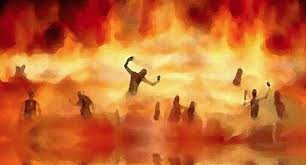|
Getting your Trinity Audio player ready...
|
Resumo: O texto argumenta contra a interpretação literal do conceito de “inferno eterno” na Bíblia, afirmando que a punição divina descrita nas escrituras se refere a consequências terrenas e não a um castigo após a morte. O autor analisa diversas passagens bíblicas, mostrando que as penalidades mencionadas estão ligadas à vida presente e que a ideia de sofrimento eterno é uma interpretação equivocada, possivelmente influenciada por fatores culturais e históricos. Ele critica o uso de ameaças infernais pelas religiões dogmáticas como forma de controle, propondo uma visão de Deus pautada no amor e na misericórdia. A análise apresentada busca promover uma interpretação mais contextualizada e menos literal das escrituras.
Palavras-chaves: inferno eterno, consequências terrenas, sofrimento eterno, controle religioso, amor e misericórdia.
Summary: The text argues against the literal interpretation of the concept of “eternal hell” in the Bible, stating that the divine punishment described in the scriptures refers to earthly consequences and not to a punishment after death. The author analyzes several biblical passages, showing that the penalties mentioned are linked to the present life and that the idea of eternal suffering is a mistaken interpretation, possibly influenced by cultural and historical factors. He criticizes the use of hellish threats by dogmatic religions as a form of control, proposing a vision of God based on love and mercy. The analysis presented seeks to promote a more contextualized and less literal interpretation of the scriptures.
Keywords: eternal hell, earthly consequences, eternal suffering, religious control, love and mercy.


